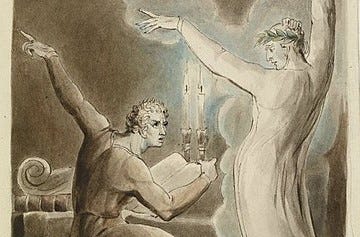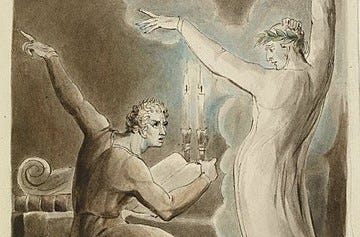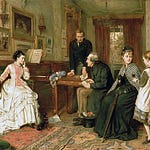Note: Due to a technical glitch with Substack, this post did not go out as scheduled. Our apologies!
Our Poem of the Week is a soliloquy from Shakespeare’s second most quotable play — second to Hamlet, though you could make a case for Romeo and Juliet, A Midsummer Night’s Dream, and Macbeth. Brutus is a friend of Caesar, and an ally of Cicero and whatever party was left of those senators who longed for a return to the glory days of the Roman republic. For many decades, Rome has been governed, effectively, by a series of military rulers, Marius, Sulla, Pompey, and now Caesar; their armies were loyal not to the state but to their commanders. The return may well have been impossible by then. The Senate was too rich, and too satisfied with their riches, and Rome was now an empire, with many a province to plunder. That last wasn’t Rome’s way, not really. The chief expense of the state was the army, and under the emperors soon to come, that army, stretched over a frontier of thousands of miles, would be funded by what we’d call four or five cents on the dollar. Rome wanted to govern, and you can’t do that well if you are inspiring insurrections all over the place, constantly. So Julius Caesar had himself made dictator for life. You see, dictator was a long-recognized ad hoc office in the Roman state, set up for military emergencies, with a term of six months, not renewable, after which the dictator would have to address any complaints or charges made against him. But the Romans detested the name and the very idea of a king: they revered as the founder of their republic Brutus the Liberator, who with his allies drove out the last Etruscan king of Rome, Tarquin the Proud, in 509 B.C. And now this new Brutus is mulling over what to do now that Caesar seems to be hankering after a crown. He has, in other words, a terrible decision to make.
The decision has been thrust upon him by his friend Cassius, whose personal envy and hatred of Caesar is greater than his care for the Roman state. “Yon Cassius has a lean and hungry look,” says Caesar to Mark Antony. “He thinks too much; such men are dangerous.” Caesar is right about that. For Cassius goes to Brutus in secret to persuade him, or rather to tempt him, depending on how you look at it, to lead a plot to do away with Caesar. He says that he and Brutus and all the other noble Romans should be ashamed of themselves for letting Caesar rise so high. “The fault, dear Brutus, lies not in our stars, / But in ourselves, that we are underlings.” Yet all that we see of Caesar in this play suggests a man fit to govern. He is offered a crown, ceremonially, at the festival of the Lupercal, but he rejects it. When some of his secret enemies appeal to him, in person, to release a certain nobleman from his banishment, Caesar refuses. He will not, he says, bend to such appeals. “I am as constant as the northern star,” he says. So much for the corruption of personal influence.
The fear, then, is not for what Caesar is doing, but for what he might do. But that’s a hill of sand to tread upon. We can say that someone’s false principles might lead, logically, to a bad conclusion. We can say that a society’s acceptance of an evil implies the acceptance of other and perhaps lesser but still unexpected evils. But we can hardly say that the personal commission of one sin entails the commission of greater and different sins to come. People are not so predictable. So Brutus has quite a job to so. The virtuous Stoic orator and statesman and philosopher doesn’t talk himself into assassination so easily.
It’s nighttime, and Brutus cannot sleep. He calls for a light from his loyal servant boy, Lucius, and has to wake him up to do that; we will see a similar scene on his last night on earth, when Brutus calls on the sleepy lad to play him some soft music. That is when he will see great Caesar’s ghost. But now, we watch, from the outside looking into a man’s mind, to see how he argues himself into betraying and killing a man who is both his friend and his benefactor, and again, not for what he has done, but for some unstated thing or things he might do. It is, says Brutus, to “kill the serpent” in the egg, while it is still weak and harmless. What he does not know, and what we do know, is that a young man is waiting in the wings, a fellow named Octavian, a man colder and even more cunning than Caesar, who will avenge the death of his great-uncle and adopted father, and who will become an emperor in fact. Shakespeare takes no clear sides here, not politically. But the deed itself, the assassination? A good man reasons himself into an evil deed, for a cause that is good. God help us, but we can do such things.
It must be by his death. And for my part I know no personal cause to spurn at him, But for the general. He would be crowned: How that might change his nature, there’s the question. It is the bright day that brings forth the adder, And that craves wary walking. Crown him that, And then I grant we put a sting in him That at his will he may do danger with. The abuse of greatness is when it disjoins Remorse from power. And, to speak truth of Caesar, I have not known when his affections swayed More than his reason. But ’tis a common proof That lowliness is young ambition’s ladder, Whereto the climber-upward turns his face; But, when he once attains the upmost round, He then unto the ladder turns his back, Looks in the clouds, scorning the base degrees By which he did ascend. So Caesar may. Then, lest he may, prevent. And since the quarrel Will bear no color for the thing he is, Fashion it thus: that what he is, augmented, Would run to these and these extremities. And therefore think him as a serpent’s egg, Which, hatched, would, as his kind, grow mischievous, And kill him in the shell.













Share this post